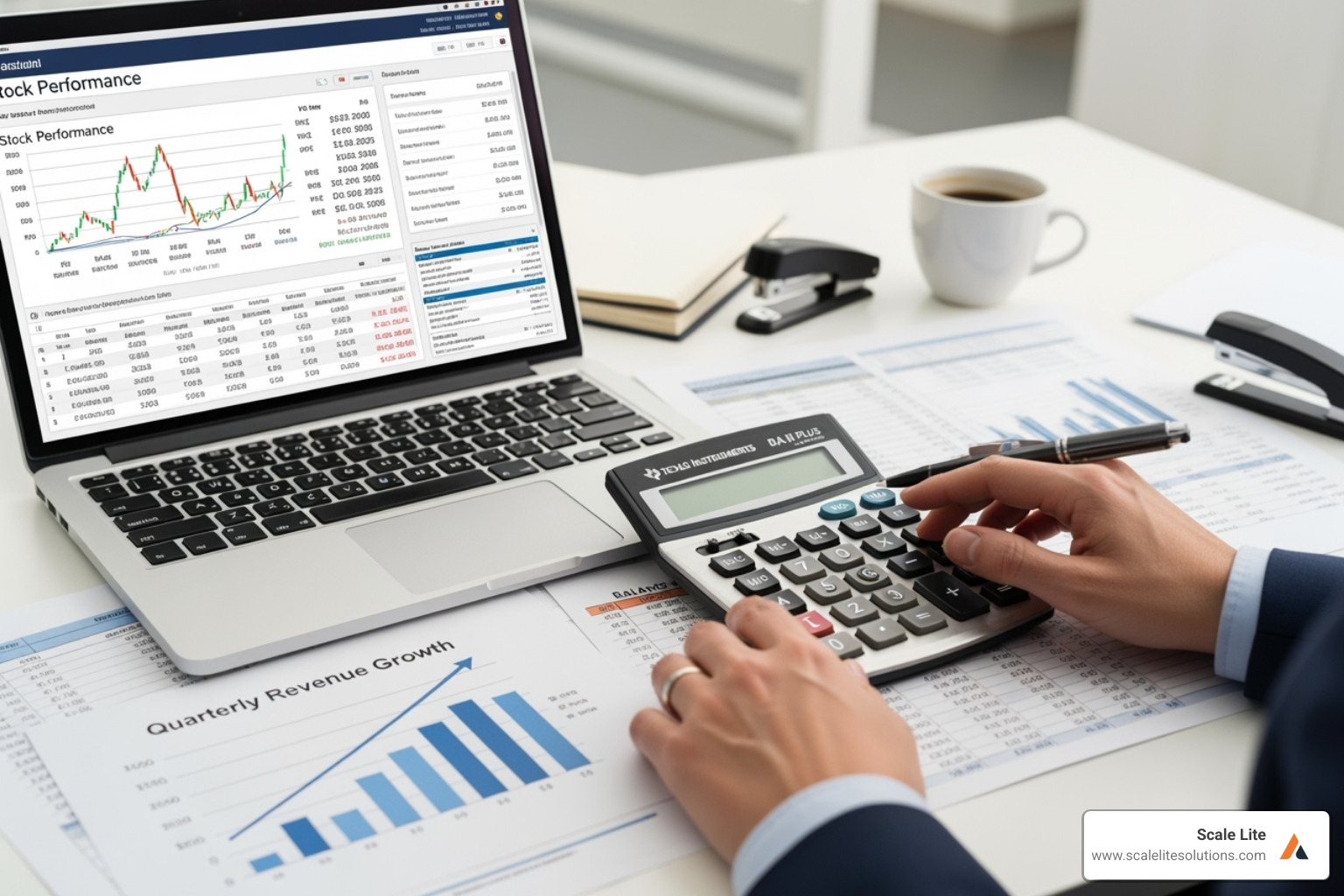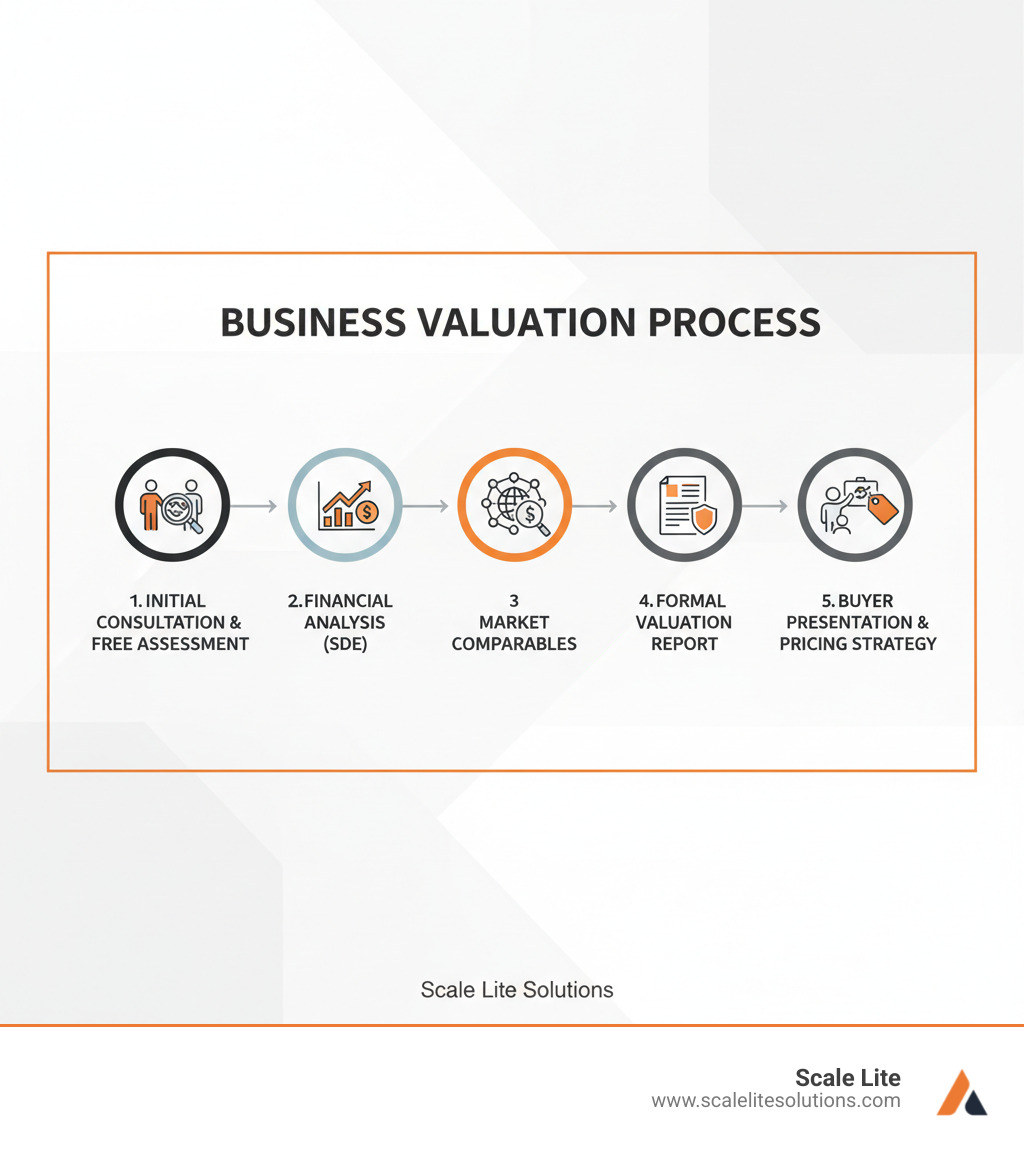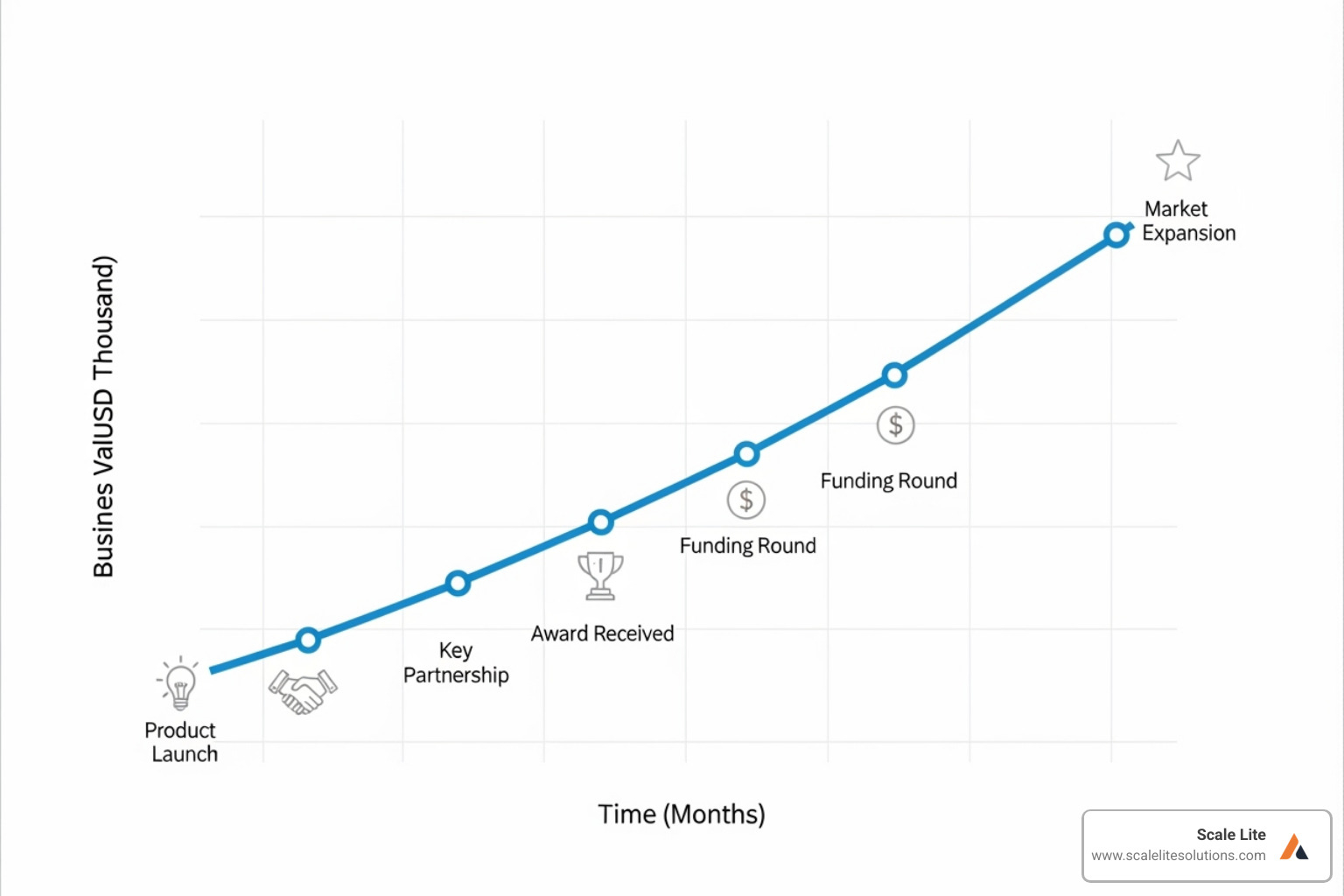
Small Business Valuation Made Easy with These Top Business Brokers

Open uping Your Business's True Worth
Finding the best business broker for small business valuation means understanding what makes a broker effective. The right one combines market knowledge, proven valuation methods, and a strong buyer network to maximize your business's value.
Top business brokers for small business valuation typically offer:
- Free initial assessments (Broker's Opinion of Value)
- Industry specialization
- Certified credentials like CBI (Certified Business Intermediary)
- Success-based fees (no payment until your business sells)
- Large buyer networks
- Confidential marketing using NDAs and teasers
Your business represents years of hard work. As one business owner noted, "You have invested years of your life creating, sculpting, and refining your business." An accurate valuation is the critical first step whether you plan to sell, seek financing, or simply understand your company's worth.
Most brokers use Seller's Discretionary Earnings (SDE) for small business valuations. They adjust profits by adding back the owner's salary, benefits, and one-time expenses to show a new buyer the true earning potential. This provides a more accurate picture than raw profit numbers.
I'm Keaton Kay, founder of Scale Lite Solutions. With a background in private equity at Garden City evaluating companies for acquisition, I've learned that finding the best business broker for small business valuation requires understanding both the technical side of valuation and the strategies that attract buyers.

Best business broker for small business valuation terms to know:
Why a Professional Broker is Your Greatest Asset for Valuation

A professional business broker acts as your advocate and shield. The moment word gets out that your business is for sale, confidentiality becomes your most valuable asset. Employees may worry about their jobs, customers might leave, and competitors could try to poach clients.
A skilled broker prevents this by managing the entire process with discretion. They use Non-Disclosure Agreements (NDAs) to legally bind potential buyers to secrecy before your company's name is even revealed. They also create "teaser documents"—short, anonymous summaries that generate interest without giving away your identity.
Beyond protection, a broker creates a competitive environment that drives up your sale price. Instead of dealing with one buyer, they tap into their networks, which can include over 40,000 potential buyers. This level of exposure is impossible to achieve on your own.
When offers arrive, your broker becomes your chief negotiator. They know how to defend your valuation to skeptical buyers and their lenders, structure deals for tax efficiency, and secure the best possible terms. Richard Tucker, who sold his company through a broker, said: "Pacific Sales just sealed the deal for the sale of my construction company. I couldn't ask for a more professional team to market and then finish with a sale of my company. They are knowledgeable and determined to get the job done."
This professional approach attracts serious, qualified buyers who can actually close the deal. A well-researched valuation gives buyers confidence in your asking price, which is crucial for securing bank financing. For businesses seeking strategic investors, this process is even more critical. You can learn more about Strategic Investor Engagement. A broker's network provides access to a much larger pool of buyers, including private equity firms and strategic acquirers. For service business owners, our guide on How to Sell a Service Business covers the unique aspects of these transactions.
A broker manages the complex sales process from start to finish, saving you time and stress so you can continue running your business. When looking for the best business broker for small business valuation, you're seeking a partner to protect your interests while maximizing your company's value.
De-Mystifying the Valuation Process: How Brokers Determine Worth

Many business owners find valuation mysterious, but the process is more straightforward than you might think. It combines the science of financial formulas with the art of understanding your industry and current market conditions. A proper valuation isn't just for a "for sale" sign; it's a powerful strategic planning tool. For a deeper dive, see our Service Business Valuation: The Complete Guide. Experienced brokers use multiple methods to ensure the final valuation is both accurate and defensible.
Key Valuation Methods Explained
The most common starting point is Seller's Discretionary Earnings (SDE). This method shows a new owner the business's true earning potential. Brokers start with your net profit and then add back expenses a new owner wouldn't have, such as your salary, benefits, personal expenses run through the business, and one-time costs. As our research shows, brokers "refine Seller Discretionary Earnings (SDE) by adding back owner's wages, personal expenses, and one-time costs for a more precise economic picture."
Other key methods include:
- Earnings Multiples: Once SDE is calculated, brokers apply an industry-specific multiple (e.g., 3x SDE) based on what similar businesses have sold for.
- Market Comparables: Like real estate comps, this method analyzes recent sales of similar businesses in your industry and area.
- Discounted Cash Flow (DCF): This projects your future earnings and calculates their present-day value, which is useful for growing businesses.
- Asset-Based Approach: This values the business based on the fair market value of its assets minus its liabilities.
External factors also play a role. As Synergy Business Brokers notes, "interest rates are expected to come down in 2024 & 2025," which could improve buyer financing and lead to higher valuations.
Broker's Opinion of Value vs. Certified Appraisal
It's important to know the difference between valuation types.
A Broker's Opinion of Value (BOV) is a practical, 10-15 page market-focused report used to set a realistic listing price. It's based on the broker's daily experience with what buyers are actually paying. Many brokers offer an initial BOV for free.
A Certified Business Appraisal is a formal, 70-90+ page document that follows strict Uniform Standards of Professional Appraisal Practice (USPAP). Our research indicates, "USPAP represents generally accepted and recognized standards of appraisal practice." You typically need this for legal or tax situations like partner buyouts, divorce, estate planning, or some SBA loans.
The best business broker for small business valuation will advise which type you need. To understand the credentials behind these reports, you can learn about professional standards from the International Business Brokers Association (IBBA).
Finding the Best Business Broker for Small Business Valuation: 3 Key Profiles
Choosing the best business broker for small business valuation is like finding the right partner for your business's final chapter. Look for a proven track record, industry specialization, and a large buyer network. Also, understand their fee structure; performance-based fees, where brokers are paid only when your business sells, align their interests with yours.
Let's explore three broker profiles that deliver exceptional results:
The Industry Specialist
This broker speaks your business language fluently. They have deep knowledge of your specific market and recognize value drivers a generalist might miss. For example, a specialist in digital businesses understands the value of recurring revenue and client contracts. They have cultivated networks of buyers actively seeking businesses just like yours, leading to better valuations and smoother transactions.
The M&A Veteran
For businesses with higher valuations (often over $5 million) or complex structures, an M&A veteran is a strong choice. These professionals are experienced in larger, intricate deals, including working capital negotiations and sophisticated due diligence. They have established relationships with private equity firms and strategic buyers, and they know how to position your company to attract them.
The Tech-Forward Broker for the best business broker for small business valuation
In today's market, the most effective brokers leverage technology. A tech-forward broker uses data analytics for valuation accuracy and to identify buyer trends. They employ modern digital marketing to reach targeted audiences and use advanced CRM systems to manage leads efficiently. By applying a Data-Driven Business Strategy, they present your business professionally and streamline the sales process, which today's buyers expect.
The right broker profile depends on your business, industry, and transaction size. Consider which approach best matches your needs.
Preparing for Success: How to Get Your Business Ready for Valuation
Preparing for valuation is like staging a house for sale. The best business broker for small business valuation can achieve more when you've done the prep work. Starting early is crucial. Clean books and organized records don't just smooth the process—they increase your business's perceived value. Buyers get nervous about messy financials and make lower offers.
A well-prepared business tells a story of competence, giving buyers confidence. One of the biggest mistakes is having unrealistic expectations about value, which a broker from our research called a "common dealbreaker." Proper preparation helps you understand your business's true market worth. For more strategies, see our guide on Business Value Improvement.
Your Pre-Valuation Checklist
Before meeting a broker, tackle these key items:
- Financials: Gather 3-5 years of P&L statements, balance sheets, and cash flow statements, plus corresponding business tax returns.
- Add-Backs: Document all adjustments for Seller's Discretionary Earnings (SDE), including your salary, benefits, personal items, and one-time costs. Be ready to justify each one.
- Assets: Create a detailed inventory of all assets, including equipment, vehicles, and intellectual property (trademarks, customer lists, proprietary processes).
- Systems: Systemize your operations so the business isn't dependent on you. Buyers pay a premium for Businesses That Run Themselves.
- Exit Plan: Clarify your personal goals for the sale. Understanding your goals helps your broker find the right buyer. Learn more about the Importance of Exit Strategy.
Common Pitfalls to Avoid in Small Business Valuation
Even with a great broker, these mistakes can derail a sale:
- Emotional Overvaluation: Buyers don't share your emotional connection; they look at numbers and risk. Pricing based on emotion kills deals.
- Messy Financials: Disorganized books are a major red flag, suggesting poor management and making due diligence a nightmare.
- Hiding Problems: Buyers will find issues during due diligence. Be upfront about challenges and how you've addressed them to build trust.
- Misunderstanding SDE: Not all expenses can be "added back." Buyers and lenders have strict rules, so work with your broker to get this right.
- Rushing the Exit: A hasty exit often means accepting a lower offer. A proper Business Exit Plan should be developed years, not months, in advance.
Frequently Asked Questions about Small Business Valuation
When you're searching for the best business broker for small business valuation, you probably have plenty of questions swirling around in your head. Let's tackle the most common ones we hear from business owners who are just starting this journey.
What are the typical fees for a business broker's valuation service?
Here's some good news: many brokers want to earn your business, so they often provide a free initial assessment or preliminary Broker's Opinion of Value (BOV) at no cost to you. This gives you a solid starting point to understand where your business stands in the market without any upfront investment.
Think of this free assessment as a broker's way of showing you what they can do. It's their chance to demonstrate their expertise while giving you valuable insights into your business's worth.
However, if you need a formal Certified Business Appraisal - the kind that's legally defensible and required for things like divorce proceedings or estate planning - that's a different story. These comprehensive reports require significant time and specialized expertise, so they do come with a fee.
The beautiful thing about working with most brokers is their success-based fee structure. As Synergy Business Brokers puts it, many brokers operate on a "no fee until your business is sold" model. This means they only earn their commission when you successfully sell your business, which perfectly aligns their interests with yours. You both win when the deal closes.
Some brokers might ask for an upfront retainer, but make sure to clarify whether this gets credited toward your final commission. The best approach is to ask direct questions about all fees upfront so there are no surprises later.
How important are certifications like CBI for finding the best business broker for small business valuation?
Certifications like Certified Business Intermediary (CBI) are incredibly important - think of them as your quality assurance stamp. When you see these credentials, you know you're working with someone who has met rigorous standards for education, experience, and ethical conduct.
As noted in our research, "Professional certifications like Certified Business Intermediary (CBI) and designations like M&AMI are crucial for broker credibility and expertise." The CBI certification, issued by the International Business Brokers Association (IBBA), means your broker has undergone specialized training in business valuation, marketing, negotiation, and closing transactions.
Here's why this matters to you: a certified broker stays current with the latest valuation methodologies, market trends, and legal requirements. They've invested in their professional development and are held to higher ethical standards. When you're making one of the biggest financial decisions of your life, having someone with proven expertise in your corner provides invaluable peace of mind.
It's like choosing between a licensed contractor and someone who just says they know how to build. Both might get the job done, but one has proven their competence through rigorous testing and ongoing education.
How long does a business valuation take?
The timeline really depends on what type of valuation you need and how complex your business is.
For a Broker's Opinion of Value (BOV) - the kind used to set your listing price - you're typically looking at a few weeks, assuming you have your financial documents organized and ready to go. This is the faster option because it's designed to be practical and market-focused.
A formal Certified Business Appraisal is much more thorough and time-intensive. Peak Business Valuation, described as the "highest-rated and most reviewed valuation firm in the United States," states they "deliver most valuations within 5 to 14 business days." However, this timeline can stretch longer depending on your business's complexity and industry.
The biggest factor affecting timeline? Your preparation. The more organized your financial records are, the faster everything moves. It's like having all your ingredients prepped before cooking - the actual process becomes much smoother and quicker.
If your books are messy or incomplete, expect delays while the appraiser sorts through everything. This is why we always recommend getting your financial house in order well before you start the valuation process.
Conclusion: Your Valuation Is the First Step to a Successful Exit
Finding the best business broker for small business valuation is about much more than just getting a number on paper. You're looking for a strategic partner who understands your journey and can guide you through one of the most significant financial decisions of your life.
Think about it: you've poured years of your heart and soul into building your business. Every late night, every difficult decision, every small victory has led to this moment. The right broker doesn't just see dollar signs—they see the story behind those numbers and know how to tell it in a way that resonates with buyers.
A skilled broker provides an objective assessment of your business's true worth, something that's nearly impossible to do when you're emotionally invested. They steer the complex marketplace with expertise you simply can't develop overnight. More importantly, they help you achieve maximum value for all that hard work and dedication you've invested.
The best business broker for small business valuation transforms what could be an overwhelming and stressful process into a streamlined path toward your successful exit. They handle the confidential marketing, screen potential buyers, and negotiate on your behalf while you continue running your business.
But here's something many business owners don't realize: your preparation before meeting with any broker can make or break your valuation. The most successful exits happen when businesses are already operating like well-oiled machines—systems in place, processes documented, and operations that don't completely depend on the owner being there every day.
This is where many service businesses fall short. They're profitable but entirely dependent on the owner's daily involvement. Buyers want businesses that can thrive without the current owner, and they're willing to pay premium prices for that kind of operational independence.
At Scale Lite Solutions, we specialize in modernizing service businesses in traditional industries. We help transform owner-dependent operations into systematic, scalable companies through smart technology deployment, workflow automation, and data-driven processes. Our approach drives real enterprise value—the kind that makes brokers' jobs easier and buyers more excited.
When your business runs smoothly without your constant oversight, when your systems capture valuable data, and when your operations are optimized for efficiency, you're not just another small business on the market. You're a growth opportunity that sophisticated buyers recognize and compete for.
Ready to build a business that buyers will love? Find how to create a hands-off operation.







